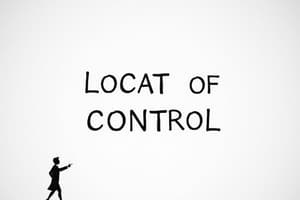Podcast
Questions and Answers
According to Rotter's expectancy theory, which of the following cognitions would lead to someone having a studious personality? (Select all that apply)
According to Rotter's expectancy theory, which of the following cognitions would lead to someone having a studious personality? (Select all that apply)
- The expectancy that studying will lead to good grades (correct)
- Placing a high value on academic success (correct)
- Low motivation
- An internal locus of control (correct)
What does openness to experience refer to?
What does openness to experience refer to?
Imaginative vs. down to earth, likes variety vs. likes routine, independent vs. conforming
Define extraversion.
Define extraversion.
Sociable or retiring, fun-loving or somber, affectionate or reserved
What are the traits associated with conscientiousness?
What are the traits associated with conscientiousness?
What does agreeableness refer to?
What does agreeableness refer to?
Define neuroticism.
Define neuroticism.
What is the Thematic Apperception Test (TAT)?
What is the Thematic Apperception Test (TAT)?
What does the NEO Personality Inventory involve?
What does the NEO Personality Inventory involve?
Describe the Rorschach inkblot test.
Describe the Rorschach inkblot test.
What is personality in everyday life used for?
What is personality in everyday life used for?
What are self-report measures?
What are self-report measures?
What do projective measures examine?
What do projective measures examine?
Which of the following are results from twin and adoption personality studies? (Select all that apply)
Which of the following are results from twin and adoption personality studies? (Select all that apply)
What is the working self-concept?
What is the working self-concept?
Define sense of self.
Define sense of self.
What is self-esteem?
What is self-esteem?
What is a self schema?
What is a self schema?
In different social situations, how does Chester's working self-concept vary?
In different social situations, how does Chester's working self-concept vary?
Identify the true statements about the five-factor theory.
Identify the true statements about the five-factor theory.
Classify the descriptions and examples as relating to either weak or strong situations:
Classify the descriptions and examples as relating to either weak or strong situations:
Classify the traits of introverts and extraverts:
Classify the traits of introverts and extraverts:
Who is associated with unconditional positive regard?
Who is associated with unconditional positive regard?
What concept is Albert Bandura known for?
What concept is Albert Bandura known for?
Who is associated with the locus of control?
Who is associated with the locus of control?
What is Sigmund Freud known for?
What is Sigmund Freud known for?
Classify the qualities as relating to either collectivist or individualist societies:
Classify the qualities as relating to either collectivist or individualist societies:
Which of the following are basic tendencies in personality and which are characteristic adaptations?
Which of the following are basic tendencies in personality and which are characteristic adaptations?
Study Notes
Personality Traits
- Openness to Experience: Reflects creativity, preference for variety, and independence. Opposed to being down-to-earth, routine-oriented, and conforming.
- Extraversion: Indicates sociability and liveliness. Contrasts with being reserved, serious, and somber.
- Conscientiousness: Characterizes organization and diligence. Opposed to disorganization, carelessness, and lack of self-discipline.
- Agreeableness: Involves compassion and cooperativeness, contrasting with ruthlessness and distrust.
- Neuroticism: Associated with emotional instability. Opposite traits include calmness, security, and self-satisfaction.
Personality Assessment Tools
- Thematic Apperception Test (TAT): Requires storytelling about ambiguous images to reveal underlying thoughts and feelings.
- NEO Personality Inventory: A self-assessment tool where individuals rate their traits.
- Rorschach Inkblot Test: Involves interpreting inkblots to explore personality and emotional functioning.
- Self-Report Measures: Use questionnaires for personality assessment without delving into unconscious motives.
- Projective Measures: Use ambiguous stimuli to uncover unconscious processes.
Personality Development Insights
- Twin and Adoption Studies: Findings show identical twins raised apart share similar traits, while little parental influence is observed on adopted children’s personalities.
- Working Self-Concept: Refers to the immediate and context-dependent perception of oneself.
- Sense of Self: Encompasses identity and self-belief.
- Self-Esteem: Relates to the emotional aspect of one’s self-concept.
- Self-Schema: Represents a coherent set of memories and beliefs about oneself.
Situational Influences on Personality
- Weak Situations: Environments that reveal personality differences, such as parties or restaurants.
- Strong Situations: Settings like job interviews or funerals that suppress individuality and reveal less personality variance.
Introversion vs. Extraversion
- Introverts: Prone to distraction in noisy environments, generally above their optimal arousal levels.
- Extraverts: Typically under-aroused and thrive in stimulating environments, actively seeking new experiences.
Theoretical Frameworks
- Carl Rogers: Advocated for unconditional positive regard in personal development.
- Albert Bandura: Introduced the concept of reciprocal determinism, emphasizing the interaction of behavior, environment, and consciousness.
- Julian Rotter: Developed the idea of locus of control, differentiating between internal and external belief systems.
- Sigmund Freud: Focused on psychosexual development in understanding personality formation.
Cultural Perspectives on Personality
- Collectivist Societies: Emphasize conformity, social connections, family ties, and obedience to authority.
- Individualist Societies: Highlight diversity, self-expression, personal rights, and distinct self-concepts focused on individual success.
Five-Factor Theory
- Predicts marriage satisfaction and behavior based on scores of the Big Five personality traits, establishing it as a dominant personality framework in psychology.
Studying That Suits You
Use AI to generate personalized quizzes and flashcards to suit your learning preferences.
Description
Test your knowledge of key concepts from Chapter 13 on self and personality in psychology. This quiz includes important theories such as Rotter's expectancy theory and traits related to openness to experience. Perfect for students looking to reinforce their understanding of personality psychology.




